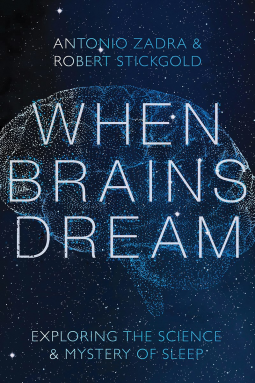
When Brains Dream
Exploring the Science and Mystery of Sleep
by Antonio Zadra, Robert Stickgold
This title was previously available on NetGalley and is now archived.
Send NetGalley books directly to your Kindle or Kindle app
1
To read on a Kindle or Kindle app, please add kindle@netgalley.com as an approved email address to receive files in your Amazon account. Click here for step-by-step instructions.
2
Also find your Kindle email address within your Amazon account, and enter it here.
Pub Date 12 Jan 2021 | Archive Date 31 Dec 2020
Talking about this book? Use #WhenBrainsDream #NetGalley. More hashtag tips!
Description
A comprehensive, eye-opening exploration of what dreams are, where they come from, what they mean, and why we have them.
Questions on the origins and meaning of dreams are as old as humankind, and as confounding and exciting today as when nineteenth-century scientists first attempted to unravel them. When Brains Dream addresses the core questions about dreams while illuminating the most up-to-date science in the field. Written by two world-renowned sleep and dream researchers, it debunks common myths—that we only dream in REM sleep, for example—while acknowledging the mysteries that persist around both the science and experience of dreaming.
Antonio Zadra and Robert Stickgold bring together state-of-the-art neuroscientific ideas and findings, and propose a new and innovative model of dream function called NEXTUP—Network Exploration to Understand Possibilities. By detailing this model’s workings, they help readers understand key features of several types of dreams—from prophetic dreams to nightmares and lucid dreams—and explain everything from how dreams can facilitate creativity to why they can be a source of personal insight.
About the Authors: Antonio Zadra is a professor at the Université de Montréal and a researcher at the Center for Advanced Research in Sleep Medicine. He lives in Quebec.
Robert Stickgold is a professor at Harvard Medical School and director of the Center for Sleep and Cognition. He lives in Cambridge, Massachusetts.
Available Editions
| EDITION | Hardcover |
| ISBN | 9781324002833 |
| PRICE | US$27.95 (USD) |
Featured Reviews
I received a copy of this book from NetGalley to allow me to provide an honest review.
This was a fascinating read. The book gave a great overview of the current state of the science of sleeping and dreaming. The presentation of the authors' theory of dreaming was cogent and provided a compelling case for the role of dreaming in memory and interpreting associations.
I think this book would be intriguing to a wide audience and will be recommending it to students in my Health Psychology class, where sleep and dreams are predictable favorite topics of the semester.
This was the most comprehensive book I've ever read about dreams written by two scholars. Antonio Zadra is a professor at the University of Montreal and a researcher at the Center for Advanced Research in Sleep Medicine. Robert Stickgold is a professor at Harvard Medical School and director of the Center for Sleep Cognition. Many years of knowledge is included within the pages.
"When Brains Dream" starts with a history of scientist - Freud, Jung and many others - who have researched and documented their findings with fierce objections. It follows with over a thousand more recent reports that analyzes sleep by researchers for humans and other animals. Then there's a long explanation of why we need sleep with their own collection of dream logs..
While I'm a casual reader and could have passed over some of the scientific findings, there's an incredible amount of information revealed that makes me want to share with everyone I know. This is the first time, I've read a book with so much detail about sleep as it relates to the brain. It includes the body's function, differences with groups of men and women and how it shapes our lives. They noted how stress is a major contributor of insomnia and how dreams are just "bizarre." They said, "just like movies, our dreams have common themes that make us think about ourselves." Dreams have helped solve problems, used to write songs and novels and develop inventions. They also discuss sleep walkers, lucid dreaming and telepathic dreams. Is it a "coincidence" when someone dreams of something that hasn't happened?
In the end, the authors summarize their findings and provide the reader with a list of suggested reading and resources. For anyone interested in this field with the newest findings, it answers all of your questions and more. For those that need additional excitement, a thriller was recently released by Antonio Zadra, "The Dreamkeepers."
My thanks to the authors, publisher and NetGallery for providing me with this copy.
 Reviewer 636464
Reviewer 636464
What an interesting book! I love when I stumble upon a book about a subject I know very little about and end up finding it very compelling.
It starts with the story of how the study of dream have developed and evolved, and of all the mysteries there are still left to uncover regarding the science of dreams. It gives the current research being done on the subject and the authors' studies. The explanations are simple and concise, and as someone with no background I was able to clearly understand it - probably missing the more scientific arguments presented.
I would - and I am - recommend this book to my non-fiction reader's friends
I have always avoided books about dreams before, as although I find the whole topic interesting (I’m a lucid dreamer), I’m highly sceptical of dream interpretation. However, this book sounded like it approached things from a scientific perspective, so I decided to give it a try. I’m glad I did.
This book first covers some of the history of dream research, and previous theories about why we dream. This was all interesting to me, as I’ve never read about dreams previously. I feel that it would also be useful summary for those who have read other books on the topic.
The book then moves on to discuss what dreaming is, possible reasons why the brain dreams, and then moves on to cover the authors’ theory of dreaming. To me, it presents a compelling argument, NEXTUP seems like a plausible explanation for most dream phenomena, and why we have evolved to dream at all.
There are then chapters on various aspects of dreaming, and sleep disorders, including a discussion of ESP and precognition, as they relate to dreaming.
Overall, this was a fascinating insight into an aspect of how our brains function. I felt that the authors did a good job of remaining relatively unbiased, presenting the current evidence and their own theory. The summary at the end was great, a reminder of everything covered, and a look ahead. I’d recommend this book both to people who know nothing (apart from their own experience) about dreams, and to those with more knowledge.
I was given a free copy of this book, my opinions are my own.


















